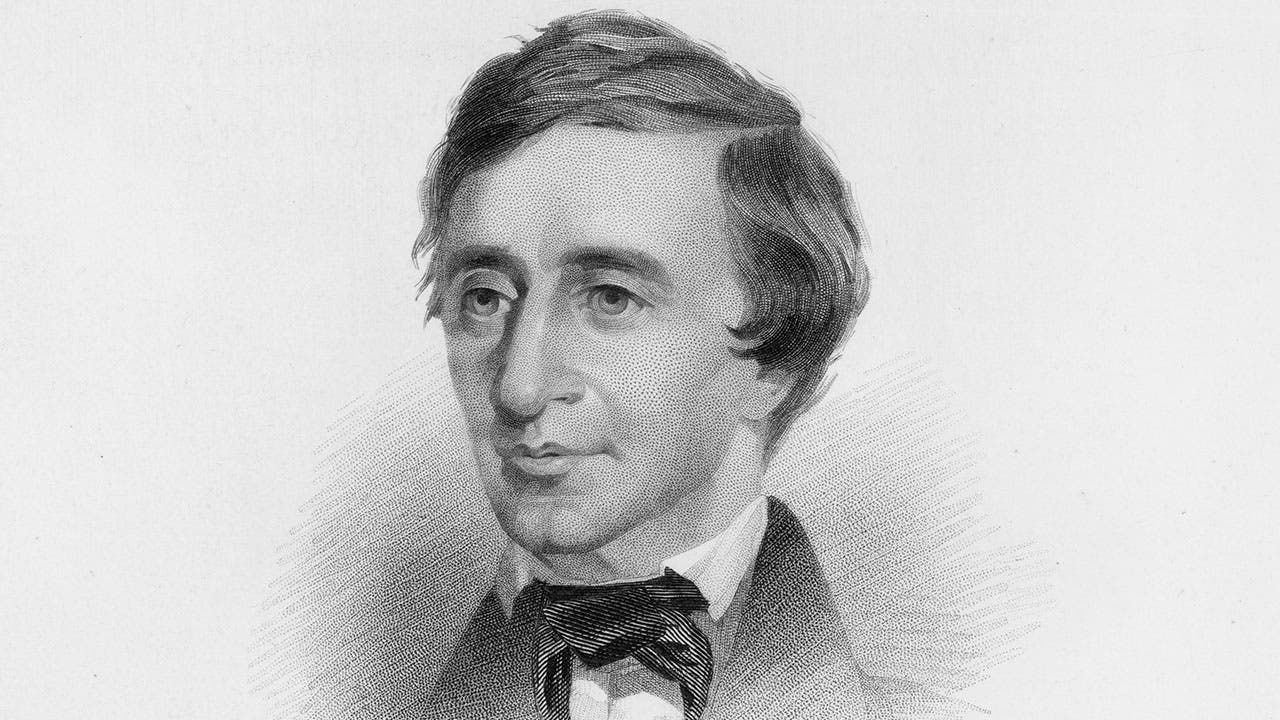Henry David Thoreau's nonfiction classic, “Walden, or A Life in the Woods,” was first published on this day in history, August 9, 1854.
“Walden” is about the virtues of simple living and self-reliance in a modern world.
It was inspired by the two years and two months Thoreau spent living in a small cabin in Concord, Massachusetts, on the edge of Walden Pond in the 1840s, the History of Massachusetts website notes.
ON THIS DAY IN HISTORY, AUGUST 8, 1974, RICHARD NIXON ANNOUNCES HIS RESIGNATION
The American transcendentalist author's work explores his views on nature, philosophy and politics, according to History.com.
“One of the most influential and compelling books in American literature, 'Walden' is a vivid account of Thoreau's years spent alone in a secluded cabin on Walden Pond,” says Princeton University Press.
Henry David Thoreau (1817-1862) was an American author and naturalist who began his career as a schoolteacher and then wrote his most famous and enduring work, “Walden, or, A Life in the Woods,” in 1854. He wrote it in a secluded cabin on the shore of Walden Pond, where he spent two years reading and communing with nature. (Hulton Archive/Getty Images)
Thoreau was a 27-year-old Harvard graduate when he moved to Walden, says History.com
The site he chose to build the cabin was on land belonging to his close friend Ralph Waldo Emerson.
He and Emerson had already discussed Thoreau's plan to live on the land, which Emerson had recently purchased, according to the University of California, Santa Barbara Library.
Thoreau's goal was to conduct an experiment in simple living, to live a life in accord with nature and to determine the real needs of life.
This quote from Walden captured the message of his book about material needs and human existence, according to multiple sources: “I went into the woods because I wished to live deliberately, to front only the essential facts of life and see if I could not learn what it had to teach, and not, when the time came to die, discover that I had not lived.”
ON THIS DAY IN HISTORY, MAY 3, 1937, MARGARET MITCHELL'S CIVIL WAR SAGA, “GONE WITH THE WIND,” WINS A PULITZER PRIZE
Thoreau's only source of income came from the labor of his own hands: he farmed, ate and sold his crops, which included beans, potatoes, corn, peas and turnips, History.com says.
Their goal was to conduct an experiment in simple living, to live a life in harmony with nature and to determine the real needs of life, Smithsonian magazine said.
The initial print run of “Walden” was 2,000 copies and the price of each book was $1.
“It would be an advantage,” Thoreau wrote in “Walden,” “to live a primitive and frontier life, though in the midst of an outside civilization.”

A sunset at Walden Pond in Concord, Massachusetts, made famous by writer Henry David Thoreau. Thoreau's description of the physical act of living day to day at Walden Pond lent authority to his book, while his mastery of a clear yet elegant style helped make it a literary classic. (John Greim/LightRocket via Getty Images)
The initial print run of “Walden” was 2,000 copies, with each book priced at $1, History.com noted.
It took five years for that run of books to sell out.
The work did not receive much attention during Thoreau's lifetime; however, Walden achieved enormous popularity in the 20th century, Britannica.com noted.
Thoreau's description of the physical act of living day to day at Walden Pond lent authority to the book, while his mastery of a clear and direct yet elegant style helped elevate the book to the level of a literary classic, the source cited.
MEET THE AMERICAN WHO WROTE 'BEN-HUR: A STORY OF THE CHRIST': UNION GENERAL LEW WALLACE
Quotes that have been woven into American society and are often repeated, according to multiple sources, include: “The mass of men live a life of quiet desperation”; “Beware of all enterprises that require new clothes”; and “If a man does not keep pace with his fellows, perhaps it is because he hears a different drummer.”
Only after Thoreau's death—and thanks to the vigorous support of his family members, Emerson, and later readers—”Walden” became a seminal work of American nonfiction and its author an American hero.
The author was born in 1817, the third of four children of a pencil manufacturer from Concord, Massachusetts, the New Yorker says.
In 1833, after graduating from Harvard, Thoreau worked as a schoolteacher and then helped run a school until his co-principal, his older brother John, died of tetanus.
MEET THE AMERICAN WHO CREATED THE 'LEGEND OF SLEEPY HOLLOW': WASHINGTON IRVING, THE FIRST AMERICAN CELEBRITY AUTHOR
When the school became too much for Thoreau to handle alone, he closed it and returned to work at the pencil factory, according to the Thoreau Society.
He was soon invited to work as a live-in handyman in the home of his mentor, neighbor and friend, Ralph Waldo Emerson, the same source said.

Henry David Thoreau wrote in “Walden”: “If a man does not keep pace with his companions, perhaps it is because he hears a different drummer.” (iStock)
Thoreau was also an activist. He gave speeches and organized meetings to protest slavery, to work for the Underground Railroad, and to defend abolitionist John Brown.
He was also inspired to write the play “Civil Disobedience,” Smithsonian magazine said.
Thoreau's legacy is perpetuated through the Thoreau Society, which promotes continued interest and research into Thoreau and his work.
For more lifestyle articles, visit www.foxnews.com/lifestyle
The Thoreau Society is the oldest and largest organization dedicated to the American author; its purpose is to promote Thoreau's life and works through education, outreach, and advocacy, according to the Thoreau Society.
CLICK HERE TO SUBSCRIBE TO OUR LIFESTYLE NEWSLETTER
Only after Thoreau's death — and thanks to vigorous support from his family members, Emerson and later readers — did “Walden” become a seminal work of American nonfiction and its author an American hero, the New Yorker reported.
CLICK HERE TO GET THE FOX NEWS APP
Thoreau died of tuberculosis in 1862.
He was only 44 years old.












